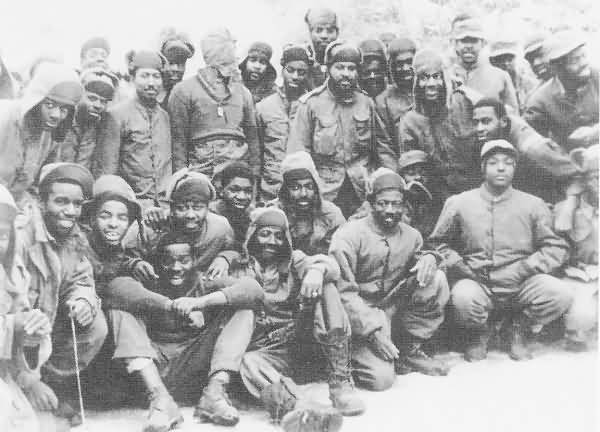This Chinese photograph says these are prisoners from the all-Negro 24th Infantry Regiment.
One of these men has the bearing of a soldier. The demeanor of the rest may be explained by noting that the 24th Infantry, known to themselves as the "Deuce Four," were commonly considered the least reliable infantry force in the United States Army.
Individually, many 24ID soldiers fought with determination and utmost bravery but as a segregated unit, among other marks of distinction, 24ID coined the phrase "Bug Out" as the primary tactical objective when facing possible combat.
Note, BK
POWs who have recently been under heavy fire and/or in extreme danger usually seem in shock for some time after capture. None of the POW photos I have, from any army in any war, show men behaving like this, e.g. check the Scots or other POW photo links.
These remarks should not be construed as a racial statement. Rather, they are a condemnation of all racial statements, such as the blindness of segregation. But, this site is an attempt to honestly portray the events of the Korean War and the kinds of men we were who fought it. In my opinion, this photo does indicate the unusual character of the 24th Infantry Regiment, which is today being lionized by many people who are motivated by political agendas, which as usual will ultimately do more harm than the simple truth.
To our shame, deliberate deceit for hidden subjective purposes is a common American political tactic. Before you read further, review your impressions about Americans who fought and suffered in the Vietnam War.
Now, ask yourself if your impressions are consistent with these facts:
Two-thirds of those who served during Vietnam were volunteers rather than draftees, and 77 percent of those who died were volunteers. Of those who died, 86 percent were Caucasian, 12.5 percent were African-American, and 1.2 percent were from other races.
Fully 91 percent of those who served in Vietnam combat stated that they were glad they had served their country, and 74 percent said they had enjoyed their time in the military. Moreover, 71 percent of those who expressed an opinion indicated that they would go to Vietnam again, even knowing the end result and the ridicule that would be heaped on them when they returned.
The main imbalance in the Vietnam war (as in the Korean War) was simply that the privileged avoided their obligations, and have persisted since that time in demeaning the war and the patriotism of those who did serve their country, in order to protect themselves from the judgment of history. Of course, there are other ways to "protect themselves". Today far more of them falsely claim to be Vietnam Veterans than ever served up country.
Reference


